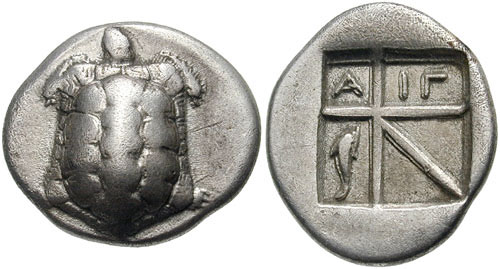It’s hard to imagine a time without money but in fact such a time did once exist.
When humans first began living off the land, there was no need for money. We would simply find the food and shelter we needed and then move on once we had bled dry those natural resources. We only owned what we could carry and there was very little reason to trade.
The Birth of Money
Most likely, trade would have begun around the same time that agriculture was born. This was the first time in human history that we began owning land and livestock and that we had more ‘belongings’ than we could carry.
In fact, agriculture is responsible for much of what we consider ‘modern life’ for better or for worse. Some people even describe agriculture as ‘domesticating’ the human race.

Greek drachma of Aegina. Obverse: Land turtle / Reverse: ΑΙΓ(INA) and dolphin. The oldest turtle coin dates 700 BC.
Once you introduce agriculture, you now have motivation to trade things like grains, animals and even land. Likewise, you could also trade services and time – you might for example offer to tend someone’s sheep in exchange for some feed. (Here you also have the basis for employment!)
Abstraction
Early on, items such as cowry shells, beads and other ‘attractive’ items were used for trade. This is where coins began to fall into use.
The initial ‘precious material’ might well have been obsidian. This material was used for creating stone tools and was in high demand. As early as 9000 BC, it began to be used in organized trade.

Obsidian artifacts excavated at Takalik Abaj, Retalhuleu, Guatemala. Prismatic blades and obsidian cores.
The need for money likely arose as tasks and challenges became more complex. As we became more proficient at catering to our basic needs, we were be able to take on more challenging goals and thus was born a need for a more advanced form of trade. If you wanted to ‘hire’ someone to work towards building you a dam, you would want to pay them with something that represents material value. This way, someone could use that form of trade over a longer period.
As Socrates put it:
When the inhabitants of one country became more dependent on those of another, and they imported what they needed, and exported what they had too much of, money necessarily came into use.
Gold would eventually become the standard for currency owing to its scarcity.
Scarcity = value, while abundance causes inflation.
Money Today
Of course money has changed a lot since those early days. As carrying around gold coins is not that convenient, gold would eventually be kept in one place while copper coins and notes could be used to represent it.
These days, money more often takes the form of ‘credits’ stored digitally on a card and recognized by the banks.
But what about the future? What will money look like in the next 10, 20 or 50 years?
Many people believe that money will eventually become entirely digital with no need for gold to be involved at all. Indeed, we’re already moving toward this end point with the introduction of Bitcoins.
Likewise, expert financial institutions such as the trading site Binary Uno have gone on record as saying that cash will soon be obsolete with all money eventually becoming digital.
What’s also interesting is that we’re currently moving back towards a ‘sharing economy’. Sites like Airbnb and Freecycle are beginning to introduce the idea of trading value and services directly rather than involving money. Meanwhile, industries including record labels and publishers are being undermined by the digitization of their products.
Watch this space… the story of money has just begun!
Photo Credits
Ancient coins – Wikimedia Creative Commons
Obsidian – Wikimedia Creative Commons
Guest Author Bio
Lauren Gask
Lauren Gask is a senior historian and anthropologist who works as a research assistant in a leading institute which aims to better the world economy, especially in developing countries. Lauren’s expertise is focused on modern economies and digital global trade.
Recent Guest Author Articles:
- New Career and Degree Paths for Educators Who Want to Make a Broader Impact
- Finding the Right Plumber in Portland: A Comprehensive Guide for Homeowners
- Why Choose Elara Caring for Jackson, MI Home Health Services?
- How I Turned Poetry into a Paycheck
- Home Is Where the Health Is: Simple Shifts for a Happier You


Please Share Your Thoughts - Leave A Comment!